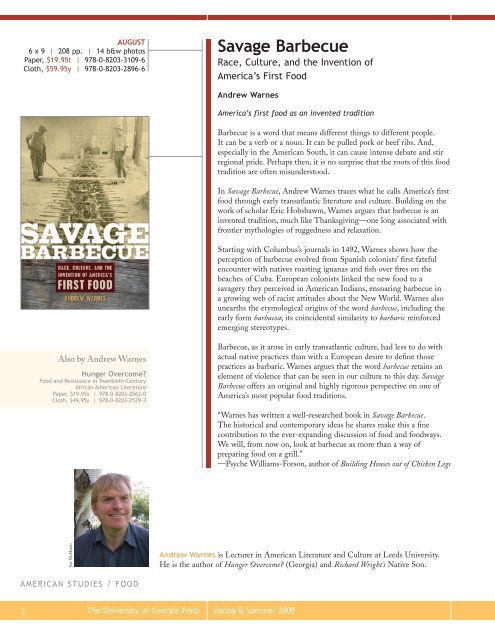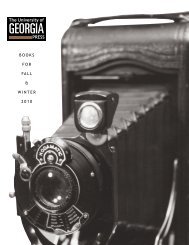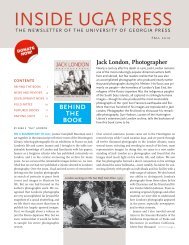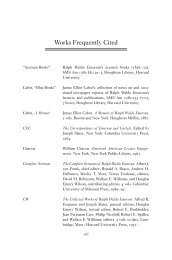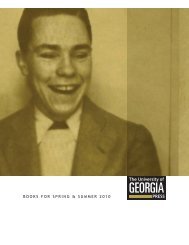Spring 2008 - University of Georgia Press
Spring 2008 - University of Georgia Press
Spring 2008 - University of Georgia Press
Create successful ePaper yourself
Turn your PDF publications into a flip-book with our unique Google optimized e-Paper software.
August<br />
6 x 9 | 208 pp. | 14 b&w photos<br />
Paper, $19.95t | 978-0-8203-3109-6<br />
Cloth, $59.95y | 978-0-8203-2896-6<br />
Savage Barbecue<br />
Race, Culture, and the Invention <strong>of</strong><br />
America’s First Food<br />
Andrew Warnes<br />
America’s first food as an invented tradition<br />
Barbecue is a word that means different things to different people.<br />
It can be a verb or a noun. It can be pulled pork or beef ribs. And,<br />
especially in the American South, it can cause intense debate and stir<br />
regional pride. Perhaps then, it is no surprise that the roots <strong>of</strong> this food<br />
tradition are <strong>of</strong>ten misunderstood.<br />
In Savage Barbecue, Andrew Warnes traces what he calls America’s first<br />
food through early transatlantic literature and culture. Building on the<br />
work <strong>of</strong> scholar Eric Hobsbawm, Warnes argues that barbecue is an<br />
invented tradition, much like Thanksgiving—one long associated with<br />
frontier mythologies <strong>of</strong> ruggedness and relaxation.<br />
Starting with Columbus’s journals in 1492, Warnes shows how the<br />
perception <strong>of</strong> barbecue evolved from Spanish colonists’ first fateful<br />
encounter with natives roasting iguanas and fish over fires on the<br />
beaches <strong>of</strong> Cuba. European colonists linked the new food to a<br />
savagery they perceived in American Indians, ensnaring barbecue in<br />
a growing web <strong>of</strong> racist attitudes about the New World. Warnes also<br />
unearths the etymological origins <strong>of</strong> the word barbecue, including the<br />
early form barbacoa; its coincidental similarity to barbaric reinforced<br />
emerging stereotypes.<br />
Also by Andrew Warnes<br />
Hunger Overcome?<br />
Food and Resistance in Twentieth-Century<br />
African American Literature<br />
Paper, $19.95s | 978-0-8203-2562-0<br />
Cloth, $49.95y | 978-0-8203-2529-3<br />
Barbecue, as it arose in early transatlantic culture, had less to do with<br />
actual native practices than with a European desire to define those<br />
practices as barbaric. Warnes argues that the word barbecue retains an<br />
element <strong>of</strong> violence that can be seen in our culture to this day. Savage<br />
Barbecue <strong>of</strong>fers an original and highly rigorous perspective on one <strong>of</strong><br />
America’s most popular food traditions.<br />
“Warnes has written a well-researched book in Savage Barbecue.<br />
The historical and contemporary ideas he shares make this a fine<br />
contribution to the ever-expanding discussion <strong>of</strong> food and foodways.<br />
We will, from now on, look at barbecue as more than a way <strong>of</strong><br />
preparing food on a grill.”<br />
—Psyche Williams-Forson, author <strong>of</strong> Building Houses out <strong>of</strong> Chicken Legs<br />
Sue McManus<br />
Andrew Warnes is Lecturer in American Literature and Culture at Leeds <strong>University</strong>.<br />
He is the author <strong>of</strong> Hunger Overcome? (<strong>Georgia</strong>) and Richard Wright’s Native Son.<br />
American Studies / Food<br />
The <strong>University</strong> <strong>of</strong> <strong>Georgia</strong> <strong>Press</strong> <strong>Spring</strong> & Summer <strong>2008</strong>


